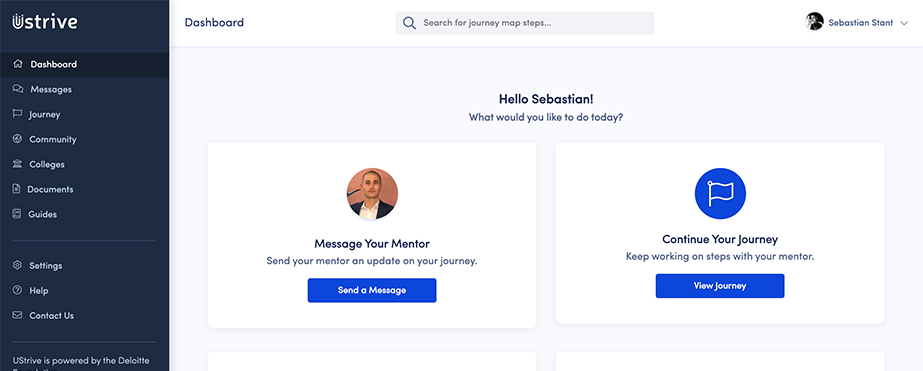Goal
Determine if You Should Transfer
Evaluate if you should transfer to another 4-year institution.
Are you in a predicament of whether to transfer to another university or not?
College Raptor has created some questions to reflect on your own and then discuss with your mentor:
Why do I want to transfer?
Are you unhappy with the faculty or the student cohort at your current school?
Do you find the location of your school boring with not much to do on the weekends?
Do you find yourself struggling to cope with the program and are you transferring to a program that is less challenging?
Or maybe the opposite—you are not challenged enough and would like to transfer to a program that is a little more demanding?
Have I given my college a fair chance?
Many college freshmen make the decision to transfer midway through their first semester. The truth is it does take time to settle in and the first semester is likely to be the hardest as you get used to this completely new way of life, make new friends, grapple with the hectic schedule, adjust to dorm life and so much more. Once you get past this initial hurdle, college life will begin to get easier. Before long you will find your groove and start enjoying yourself.
Don’t be in a hurry to transfer. Give your college a chance. Stay for at least a semester or two before taking this huge step.
What do I like about my present college? What don’t I like about it?
Do the classes and professors meet my expectations?
One area where you may not want to compromise is academics. After all, your main purpose in going to college is to get an education. If the courses and the professors at your current college are top-notch, do you really want to give that up and take a chance with another school? What if the new college does not come up to the same standard?
If the academic facilities at your current college are excellent and you enjoy your classes, you should look for solutions to the other issues you are having and stay on. On the other hand, after paying such high fees towards tuition, if your classes or professors do not meet your expectations, a transfer may be the best solution.
Will my financial aid transfer? Will I lose any aid in the transfer?
This is another important aspect that you must factor into your decision. Financial aid does not transfer automatically from one college to another. Also, the amount of aid you are eligible for may not be the same. This is because different colleges calculate aid differently even though your Expected Family Contribution (EFC) remains the same.
Before you apply for a college transfer, you must find out how it will impact your financial aid. The transfer counselor at your target school is the best person to speak to about this. They will help you understand how much financial aid you qualify for and give you the right advice about what you need to do to maximize your aid options and minimize your losses.
Will my scholarships get affected?
If you have won any scholarships, you will have to read through the terms and conditions in detail. If your scholarship was awarded on the condition that you attend a particular institution or region, it may not transfer.
How much will the transfer cost me? Is it worth it?
The total cost of a transfer will depend on several different factors. Are you moving to another school in the same location or are you moving to another city or another state? Are the tuition fees for the new college higher than your present college? What about the cost of accommodation, food, and other incidentals?
Calculate how much this transfer is going to cost you and think hard about whether it is really worth it. This ties into the earlier points. It is worth it ONLY if the transfer is for the right reasons.
After considering the questions in the “Determine if you Should Transfer” step and should you decide that transferring is right for you, there are some important thing you’ll need to know.
Where to transfer
Once you have an understanding of why you’d like to transfer, the key is to apply to universities that offer what you’re looking for. For example, if you’re a business major and attending a school that has a strong business program is important to you but would still like to stay in-state, then those are the filters you’ll want to apply when searching for colleges. Here is a good place to start: https://www.collegetransfer.net/Search/Search-for-Programs
If you’re looking for a more broad search, try: https://www.collegetransfer.net/Search/Search-for-Transfer-Profiles
Review your application deadline
Stay up to date with when to apply. If you plan to transfer to a four-year institution in the fall, your application will probably be due sometime between February-July. If you plan to transfer in the spring, your application will probably be due sometime between August-December.
Which classes transfer
In order to minimize the need to retake courses you’ve already taken, check to see if the school you’d like to apply to has course equivalencies for your classes: https://www.collegetransfer.net/Search/Search-for-Course-Equivalencies
Finances
It’s important that students understand their financial obligations and how they may change when considering another university. To review the different financial components, be sure to review the steps in Paying for College.
Acceptance rates Acceptance rates vary from school to school. To check the acceptance rate for the school you’re interested in transferring to, visit: https://www.collegetransfer.net/Search/Search-for-Colleges
Transfer rate statistics on the top 50 U.S. Schools
You can create a document in the Documents tab of your UStrive dashboard and create a table with the applicable transfer information to stay organized.
Want to learn more?
A mentor can help with this topic & many more. Join thousands of students & pick a mentor today!
It's 100% free, forever.

© UStrive 2022, All Rights Reserved


